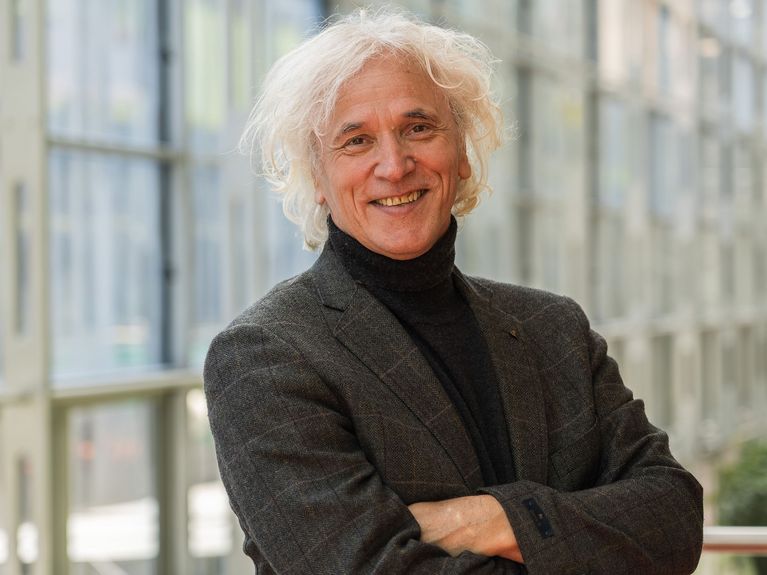Interview
"We can learn a lot from bacteria and viruses"

Josef Penninger, new scientific director of the Helmholtz Centre for Infection Research. Photo: HZI Stephan Dublasky
Josef Penninger is the new scientific director of the Helmholtz Centre for Infection Research (HZI) in Braunschweig. Here is an interview about his ambitious plans, and why it took a torn ligament to open his path to research.
Mr. Penninger, is it true that you originally wanted to become a professional soccer player?
(laughs) As a teenager, I was in the Union Gurten soccer club here in Upper Austria, that's true. And then, just before I graduated from high school, I wanted to know if I could make it as a professional so I trained incredibly hard, and then tore all the ligaments in my left ankle. At that moment I had to choose plan B, and that was university.
Given your background, wouldn't orthopedics have been closer than genetics and infection research?
I was always interested in the fundamental mechanisms at work in the body and was never good at pure memorization. One of my professors taught immunology in such a way that you understood exactly what was happening in the body. When I started working for him as a student assistant, that was my first step towards becoming a scientist.
At that time, genetics was still a young discipline ...
... and that was another reason why it was a fantastic time when some of the fundamental discoveries in immunology were made. It was clear to me early on that if I wanted to develop further, I had to go where the best laboratories were, so I came from Innsbruck to Canada. There in the laboratory we made one of the first knockout mice in the world.
What is a knockout mouse?
It's a mouse in which genetic scissors are used to switch off a specific gene in the genome. This allows us to track down its function. At the time, this was a revolution, and Toronto was and is a great place for this kind of genome engineering. For example, the world's first stem cell experiment was carried out there shortly afterwards.
With all the praise for Canada, where does Braunschweig stand?
First, let me say that the HZI is already one of the largest infection research institutes in the world and is also very competitive in terms of its research, my predecessors really achieved a lot here. That is precisely why I am sure that we have what it takes to compete for the championship every year. We should also have the ambition to reach the Champions League final. To give that extra ten percent. Incidentally, the Helmholtz Association offers a very good framework for this; we can think big within it.
Please be more specific: How do you plan to achieve your goals?
First, we will radically focus on young scientists. We want to establish a Pioneer Center for Infection Research similar to what Helmholtz Munich has, and bring 20 to 25 top young stars from all over the world to join us. There are incredibly great talents, and for them we want to build a biotope where they can develop their visions. That's one part of the plan.
And what's the second?
I want to expand the content portfolio a bit. At the moment, we have a predominantly pathogenic approach, so we are mainly developing drugs against viruses and bacteria. What I have in mind is that bacteria and viruses have survived four billion years of evolution - we can learn an incredible amount from them, they can become our teachers in certain things. That's where I want to start. In addition, I plan to focus on infection research and climate change, because this is a topic that will keep us very busy in the future.
Wait: What can be learned from bacteria and viruses?
There are an incredible number of things that lend themselves to research. The whole field of synthetic biology - i.e., the linking of molecular biology, organic chemistry, engineering sciences, nanobiotechnology and information technology - offers enormous opportunities. Viruses and bacteria can become models for us to build systems that have certain properties.
You still have a commitment in Vienna at the university, and you are also still active in Canada. Are you moving to Braunschweig now anyway?
Yes, the move is imminent. I lived in a hotel for the first few weeks, that's an interesting experience, but I'm looking forward to my own home now. And I've already noticed one thing: Braunschweig and Wolfenbüttel are really nice cities.
Have you already found a soccer club in Braunschweig?
Not yet. But I have my club in Vienna: Although I'm not really that good, I'm allowed to play in the Austrian national soccer team for doctors.
And: Are you in the Champions League there, too?
We actually played in the World Cup recently. But we ended up in last place. (laughs)
Josef Penninger is scientific director of the Helmholtz Centre for Infection Research in Braunschweig. The Austrian physician specializes in genetics in his own research. After studying and earning his doctorate in Innsbruck, he moved to the Ontario Cancer Institute in Canada and the University of Toronto. In 2003, he became the founding director of the Institute of Molecular Biotechnology at the Austrian Academy of Sciences; in 2018, he returned to Canada to become director of the Life Science Institute at the University of British Columbia. Penninger has been awarded numerous prestigious research prizes.
Readers comments